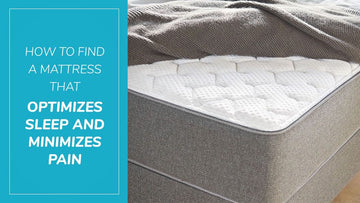News
How To Find A Mattress That Optimizes Sleep

If we truly spent a third of our life sleeping — i.e., 8 hours in a 24-hour day — we would sleep 233,366 hours during an 80-year life.
The problem is that the Centers for Disease Control and Prevention say a cool one-third of Americans aren’t getting anywhere near 8 hours per day.
That 200,000-plus hours is a pipe dream for most of us.
While physical and mental health can explain why so many Americans are sleep-deprived and sick, your mattress is also shouting at you.
Both Dr. Jon Dominique of Alpine Chiropractic and Dr. Karen Pristavec of Elite Performance Chiropractic say more than 20 percent of their patients come in complaining of pain upon waking each morning. They also say most of those patients have no idea their mattress is to blame.
Finding the right mattress takes research and patience, just like determining the problem did in the first place. What can someone do about it?
If you sleep on your back, you’re sleeping in the most natural alignment for your body. Sleeping on your side is the next best way, although you’re putting more pressure on your hips and shoulders throughout the night, especially if your mattress is old and saggy.
And as for sleeping on your stomach? That's a bad idea. This position will do the most damage to your spine over time. Chiropractors suggest you avoid it altogether and learn how to sleep on your back or side.
“It’s important to make sure your neck is square to your shoulders and not sagging to one side,” Dr. Vogan from Stewart’s Physical Therapy said. “The implications of this is a muscular issue. It can create impingements of the joints in your neck. These impingements cause pain and tightness in the neck and under the arms.”
As for your current mattress, give a real appraisal of how it fits or handles your body. Does it sag under your weight? Do you feel too warm or cold throughout the night?
Be advised that there isn't a cure-all mattress out there.There are so many choices and types because the best mattress for you will depend on your anatomy and preferences.
“The answer is not straightforward and as always the best advice I can recommend is to spend hours on the bed you’re considering buying before making your final decision,” Dr. Michael McGovern, D.C. of Chiro One Wellness Centers said. “We all have different sizes and shapes and will respond better to certain mattress types.”
And you don’t have to! These days you don’t have to pay top dollar for a quality mattress. In fact, the Aviya mattress is one-third of the price of a traditional mattress from the box-store with the same great quality. This mattress:
The best piece of advice we can leave you with is this: when shopping for a new mattress, listen to your body and what it needs to get restful sleep. It will repay you 1,000 times over.
The problem is that the Centers for Disease Control and Prevention say a cool one-third of Americans aren’t getting anywhere near 8 hours per day.
That 200,000-plus hours is a pipe dream for most of us.
While physical and mental health can explain why so many Americans are sleep-deprived and sick, your mattress is also shouting at you.
Both Dr. Jon Dominique of Alpine Chiropractic and Dr. Karen Pristavec of Elite Performance Chiropractic say more than 20 percent of their patients come in complaining of pain upon waking each morning. They also say most of those patients have no idea their mattress is to blame.
Finding the right mattress takes research and patience, just like determining the problem did in the first place. What can someone do about it?
Know Thyself
Which way do you sleep? Knowing your preferred sleeping position will help determine what type of mattress is best for you.If you sleep on your back, you’re sleeping in the most natural alignment for your body. Sleeping on your side is the next best way, although you’re putting more pressure on your hips and shoulders throughout the night, especially if your mattress is old and saggy.
And as for sleeping on your stomach? That's a bad idea. This position will do the most damage to your spine over time. Chiropractors suggest you avoid it altogether and learn how to sleep on your back or side.
“It’s important to make sure your neck is square to your shoulders and not sagging to one side,” Dr. Vogan from Stewart’s Physical Therapy said. “The implications of this is a muscular issue. It can create impingements of the joints in your neck. These impingements cause pain and tightness in the neck and under the arms.”
As for your current mattress, give a real appraisal of how it fits or handles your body. Does it sag under your weight? Do you feel too warm or cold throughout the night?
Be advised that there isn't a cure-all mattress out there.There are so many choices and types because the best mattress for you will depend on your anatomy and preferences.
“The answer is not straightforward and as always the best advice I can recommend is to spend hours on the bed you’re considering buying before making your final decision,” Dr. Michael McGovern, D.C. of Chiro One Wellness Centers said. “We all have different sizes and shapes and will respond better to certain mattress types.”
Do Your Research
Shopping for a mattress can be overwhelming. We get that. Not just any mattress will do. In order to find a mattress that optimizes sleep and minimizes pain, you’ll need to look for the mattress that best suits your body type, sleeping position, body temperature, weight and health conditions. Ask yourself the following questions:- Do I need a new mattress?
- What type of mattress do I need?
- Which qualities in mattress are most important to me? For example, firmness, support, motion transfer, pressure relief, etc.
- What type of mattress best suits my sleeping position?
Pressure Relief
Pressure relief refers to the amount of pressure a mattress puts on your joints. The shoulders and hips are areas prone to high pressure. It's important to find a mattress that doesn’t put pressure on your joints, especially your spine.Spine Alignment
Speaking of the spine, spinal alignment is how well a mattress keeps your spine in a straight line from your tailbone to your neck. A mattress’ ability to keep your spine in alignment is essential when it comes to pain management. In fact, keeping a good posture while you’re sleeping is just as important as keeping it during your waking hours. Many people with chronic back pain experience it when their mattress ‘hammocks’ them, creating a pinch point in the lower lumbar spine.Support
When shopping for a mattress, you’ll want to find something that evenly supports your body weight. Support in a mattress refers to the weight the foundation can hold to support your body properly, and it has a big effect on pain management. When a mattress loses support, which happens overtime, it will begin to sag. This can throw your spine out of alignment.Proceed With Care
A new mattress is a big investment. We know it’s tempting to settle for something cheap. But considering you spend one-third of your life on this piece of furniture, we’d advise you to not skimp on this one.And you don’t have to! These days you don’t have to pay top dollar for a quality mattress. In fact, the Aviya mattress is one-third of the price of a traditional mattress from the box-store with the same great quality. This mattress:
- Uses both foam and “individually wrapped” innerspring coils for support.
- Can be purchased at three different firmness levels.
- Offers a combination of comfort and support.
- "Feels 15 percent thicker” with an additional 3” layer of “support foam.”
The best piece of advice we can leave you with is this: when shopping for a new mattress, listen to your body and what it needs to get restful sleep. It will repay you 1,000 times over.
Related Articles

